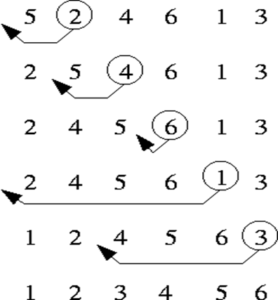Insertion Sort using loop and recursive function complete code
On the ith pass we “insert” the ith element A[i] into its rightful place among A[1],A[2],…A[i-1] which were placed in sorted order.
After this insertion A[1],A[2],…A[i] are in sorted order.
- Time taken by Insertion Sort depends on input
- Can take different amounts of time to sort 2 input sequences of the same size
- In general, the time taken by an algorithm grows with the size of the input
int j;
for int p=1; p< size (A); p++
{
int temp = A[p];
for (j=p;j>0 && temp< a[j-1]; j–)
A[j]=A[j-1];
A[j]=temp;
}
Strategy
- Start “empty handed”
- Insert a card in the right
position of the already sorted
hand - Continue until all cards are
inserted/sorted

Analysis of Insertion sort Algorithms
Efficiency:
- Running time
- Space used
int j;
for int p=1; p< size (A); p++
{
int temp = A[p];
for (j=p;j>0 && temp< a[j-1]; j–)
A[j]=A[j-1];
A[j]=temp;
}
- Number of comparison in the inner loop is dependent on value of p
- Summing all step gives

Best/Worst/Average Case
Best case: elements already sorted ® running time = O(N), i.e., linear time.
- the inner loop always fails immediately
int j;
for int p=1; p< size (A); p++
{
int temp = A[p];
for (j=p;j>0 && temp< a[j-1]; j–)
A[j]=A[j-1];
A[j]=temp;
}
Worst case: elements are sorted in inverse order ® running time = O(n2), i.e., quadratic time
- Because inner loop runs p time
int j;
for int p=1; p< size (A); p++
{
int temp = A[p];
for (j=p;j>0 && temp< a[j-1]; j–)
A[j]=A[j-1];
A[j]=temp;
}
Average case: half of the elements are sorted
- running time = O(n2),
- Inner loop runs p/2 times
int j;
for int p=1; p< size (A); p++
{
int temp = A[p];
for (j=p;j>0 && temp< a[j-1]; j–)
A[j]=A[j-1];
A[j]=temp;
}
C++ code for insertion sort using loop
#include<iostream>
#include<conio.h>
using namespace std;
void insertsort(int arry[],int n)
{
for(int wall=1; wall<n; wall++)
{
for(int i=wall; i>0; i–)
{
if(arry[i]<arry[i-1])
{ int y;
y=arry[i];
arry[i]=arry[i-1];
arry[i-1]=y;
}
else
break;
}
}
}
void main()
{
int n=10;
int arry[10];
for(int j=0; j<n; j++)
{cout<<“enter ur num at index “<<j<<” = “;
cin>>arry[j];
}
cout<<“after inseration sort “<<endl<<endl;
insertsort(arry,n);
for(int i=0; i<n; i++)
{
cout<<“ur sorted arry is “<<arry[i]<<endl;
}
getch();
}
C++ code for insertion sort using recursive function
#include <iostream>
using namespace std;
void insertionSort(int a[], int length, int round = 1);
int _tmain(int argc, _TCHAR* argv[])
{
cout<<“Insertion sort \n”;
cout<<“Enter mumber of elements : “;
int n,a[20];
cin>>n;
for(int i=0;i<n;i++){
cin>>a[i];
}
insertionSort(a,n);
cout<<“\n===============\n”;
for(int i=0;i<n;i++){
cout<<a[i]<<” “;
}
cout<<“\n===============\n”;
write system pause command here
return 0;
}
void insertionSort(int a[],int length,int round){
if(round < length)
{
int key = a[round];
int j;
for (j = round-1 ; j>=0 && a[j]>key;j–)
a[j+1] = a[j];
a[j+1]=key;
round+=1;
insertionSort(a,length,round);
}
}
Insertion sort in linklist
#include<iostream>
#include<conio.h>
#include<cstdlib>
#include<time.h>
#include<windows.h>
using namespace std;
class node
{
public:
int data;
node*next;
node*pre;
node()
{
next=NULL;
pre=NULL;
data=0;
}
};
class linklist
{
node*head;
int count;
public:
linklist()
{
head=NULL;
count=0;
}
void insert(int dataa)
{
node*p=head;
node*newnode=new node;
newnode->data=dataa;
head=newnode;
newnode->next=p;
if(p!=NULL)
p->pre=newnode;
count++;
}
void display()
{
node*p;
p=head;
while(p!=NULL)
{
cout<<p->data<<” “;
if(p->next==NULL)
break;
p=p->next;
}
}
void insort()
{
int tmp=0;
node*p=head->next,*q=head,*r,*s;
r=p;s=q;
for(int i=1;i<count&&p!=NULL;i++)
{
for(int j=i;j>=0&&q!=NULL;j–)
{
if(p->data<q->data)
{
tmp=p->data;
p->data=q->data;
q->data=tmp;
}
p=q;
q=q->pre;
}
s=r;
r=r->next;
p=r;
q=s;
}
}
node* binary_search(int dataa,int left,int right)
{
node*p;
p=head;
int mid=(left+right)/2;
for(int i=1;i<mid;i++)
p=p->next;
if(p->data==dataa)
return p;
if(left-right==0)
return NULL;
if(dataa<p->data)
return binary_search(dataa,left,mid);
else
return binary_search(dataa,mid+1,right);
}
int getcount()
{return count;}
};
int main()
{
srand(time(0));
linklist a;
for(int i=1;i<=10;i++)
a.insert(rand()%100);
a.display();
cout<<endl;
a.insort();
a.display();
int data;
cout<<endl<<“Enter data: “;
cin>>data;
node*p=a.binary_search(data,1,a.getcount());
if(p!=NULL)
cout<<p->data<<” “<<p;
else
cout<<p<<“NO DATA EXISTS”;
getch();
}
Related links
Single link list Stack AVL Trees Binary search Counting Sort
Doubly link list Queue Graphs Bubble Sort Radix sort
Circular link list Binary search tree Hashing Insertion Sort Bucket Sort
Josephus Problem Tree Traversal Heaps Quick Sort Merge Sort
At Cui tutorial, courses, past papers and final year projects
#tutorial #cui #pastpaper #courses

